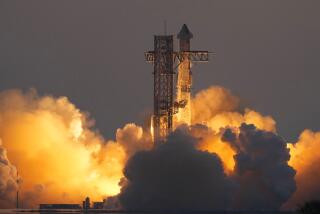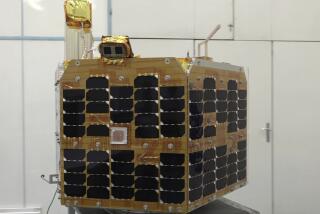Soviets Test New Space Rocket Launcher
- Share via
MOSCOW — The Soviet Union reported Saturday that it has successfully tested a powerful new multipurpose space rocket launcher that can put a payload of more than 100 tons into orbit.
The Tass news agency said the two-stage booster known as Energia was launched for the first time at 9:30 p.m. Moscow time Friday from the Baikonur cosmodrome in the central Asian republic of Kazakhstan.
Eight Engines in Rocket
A television report said the rocket had eight engines, four at the tail and four at its side, that generated 175 million horsepower.
The rocket will be used for launching space shuttles and large space vehicles for research and other purposes, Tass said without giving any details.
Military as well as civilian experts joined in creating and testing the new rocket, the official account said.
“The two-stage, multipurpose launch vehicle has a launching mass of more than 2,000 tons and is capable of putting into orbit more than 100 tons of payload,” Tass said.
“In the process of the launching and flight . . . , the correctness was borne out of the design and technology, the high reliability of its design, engines of both stages and control systems,” the news agency said.
“It opens up a new stage in the development of Soviet space rocket engineering and broad prospects for a peaceful exploration of outer space,” the Tass account added.
The Tass story, however, reported that plans to put a “mock-up satellite” into orbit failed because of an unidentified defect in the systems of the device placed atop the booster.
“The mock-up was not put into the preset orbit and splashed down in the Pacific,” the story said.
Gorbachev Visits Center
Soviet leader Mikhail S. Gorbachev visited the Baikonur Space Center last week and inspected the new rocket and preparations for launching a new Soviet space shuttle.
The main evening television news program Vremya showed the launch of the booster on Saturday’s program. In recent months, some Soviet space launchings have been shown live on television, but reports of the new booster’s first launching were delayed for almost 24 hours.
More to Read
Sign up for Essential California
The most important California stories and recommendations in your inbox every morning.
You may occasionally receive promotional content from the Los Angeles Times.









